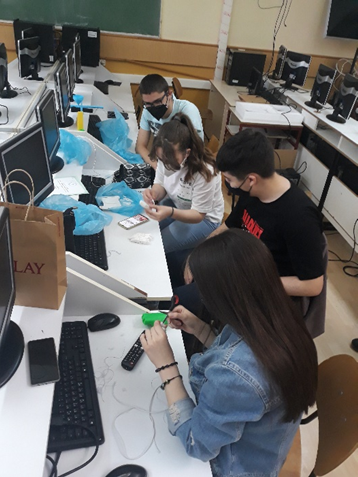[RRI Good Practice] Challenge for Young Researchers
What is the good practice about?
Modern education systems are aiming to encourage pupils to think freely and find creative solutions to the problems and issues they face. At the same time, it is important to nurture children’s curiosity about the world in a way that re-examines the pre-defined truths. The purpose is to encourage teachers, and students to recognize their abilities, improve their skills and cooperate in order to achieve common goals.
Through the "Challenge for Young Researchers", the Macedonian Fund for Innovation and Technology Development, FITD, supports research projects in life and technical sciences, at the same time enhancing aspects such as teamwork, inclusion, social cohesion, research ethics, and socio-economic benefits.
Over 100 supported school projects, improving knowledge & skills of over 500 students and teachers.

Why is this initiative needed?
North Macedonia is experiencing a tremendous loss of human potential and creative energy. One of the major factors is the poorly serving education system. In terms of learning outcomes, as measured by PISA 2015, North Macedonia is among the lowest-performing countries, ranked second last of all those participating, where more than half of students lack basic competencies. An even bigger concern is that performance has been deteriorating in contrast to the positive trend in the region and the country is facing an intensive brain drain.
A fast-changing global economy is demanding increasingly specialized and transferable skills and education systems are struggling to keep up with the pace of change. It’s no longer enough to simply get children through schooling. As they grow, girls and boys need an education with meaningful learning outcomes, broader skills, values and experiences to help them develop a growth mindset and enhance their capabilities for innovation, collaboration, employability and citizenship. Moreover, in a world of mass connectivity, young people need to be heard, to be included in the development processes designed to improve their lives."
What are the main objectives?
- provide young people with the opportunity to participate in project-based learning complementary to formal education
- equip students with problem-solving skills they will need to succeed in the ever-changing world
- enhance STEM career choices among youth
- introduce practices of RRI in primary and secondary school education
Who is involved?
- Representatives of teachers, academia and the civil sector were consulted in the initial design of the challenge (the public call and application documents)
- Feedback gathered from project proposal evaluators, grant beneficiaries and monitoring officers has been taken into consideration in advancing the design of subsequent calls
Can this good practice be replicated?
Given the common challenges and the high complexity of education reform processes, this practice of project based activities complementary to the formal curricula can be easily replicated in any WB economy.
The design of the call needs to be responsive to the financial management administrative capacities of the educational institutions and the public procurement regulative.
The pipeline and quality of projects might significantly benefit from mentorship activities e.g. prior to application and during implementation.
RRI specific issues such as ethical considerations, applicability and transferability of research results, as well as OEE might be further enhanced by tailored mentorship activities.
The grant scheme is implemented by a public institution, with an allocated annual budget of 50.000 - 100.000 EUR in direct grants (3.000 - 5.000 EUR per project) to schools funded from the central budget. 3-4 officers working on the grant scheme management.
Contacts with the project promoters can be established in case of interest!
Further links:
https://fitr.mk/en/a-challenge-for-young-researchers/
https://fitr.mk/en/public-call-for-financing-research-projects-in-primary-and-secondary-schools-challenge-for-young-researchers-4-green-projects/
https://www.youtube.com/watch?v=Cf6JRxJeKOs
Relevant RRI keys: Gender Equality in Research and Innovation (R&I), Ethics (in R&I), Science Education, Open Access, Open Science, Open Data
Type of practice: Grant scheme for research projects in primary and secondary schools
Target groups: research and innovation funding organisations, youth (children, pupils)
- Republic of North Macedonia
- Cross-thematic/Interdisciplinary
Entry created by Elke Dall on May 31, 2022
Modified on November 14, 2022

